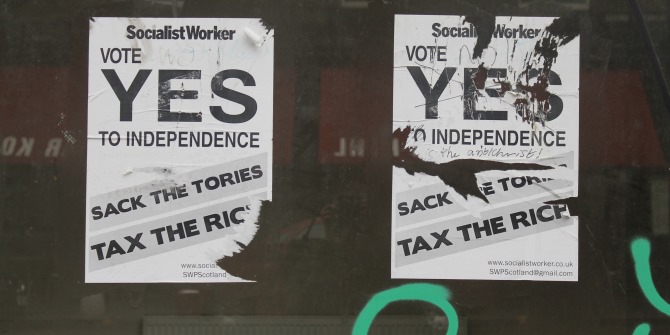 The distribution of political rights in the UK undermines the assumption of equality that underpins democratic practice, writes Sean Fox. He makes the case for extending voting rights to all legal immigrants living in the UK – whose lives are affected by government decisions as much as those who, by virtue of their citizenship, get to have a say in elections.
The distribution of political rights in the UK undermines the assumption of equality that underpins democratic practice, writes Sean Fox. He makes the case for extending voting rights to all legal immigrants living in the UK – whose lives are affected by government decisions as much as those who, by virtue of their citizenship, get to have a say in elections.
The vote to leave the EU was fundamentally undemocratic. Theresa May’s clear determination to plough ahead with Brexit therefore compounds an act of injustice that reveals a basic flaw at the heart of Britain’s electoral system. If this seems a provocative opening salvo for a radical cosmopolitan polemic, you may be surprised by the current distribution of voting rights in the UK.
Most people assume that the electoral franchise is directly linked to citizenship. But citizenship status does not (and should not) determine who has the right to vote. Citizens from the Republic of Ireland and from Commonwealth countries who are living in the UK are allowed to vote in general and local elections. They were also permitted to vote in the recent EU referendum. By contrast, EU citizens living in the UK are permitted to vote in local but not national elections and were also excluded from the referendum. Immigrants from other countries outside of the Commonwealth or EU have no voting rights at all. A peculiar consequence of this arrangement is that some EU citizens could in fact vote in the recent referendum: those from Ireland as well as those from Malta and Cyprus.
In a recently published paper I argue that this selective allocation of political rights to some resident aliens (i.e. immigrants) and not to others is an artefact of history rather than a product of adherence to clear legal or philosophical principles. And it is fundamentally undemocratic for two reasons.
First, granting only some immigrants voting rights violates the core assumption of equality among adult members of society that underpins democratic practice. How could one justify granting voting rights to people from Canada and Mozambique but not America or Angola? Are Americans and Angolans somehow lesser beings? If not, they should be treated equally when it comes to political voice. Indeed, it was precisely this argument that was used to advance the rights of women and minorities in Western democracies in the 20th century.
One might conclude that the appropriate course of action is to level the playing field by preventing all immigrants from voting so that some are not favoured over others. But this would erode UK democracy further by expanding the number of disenfranchised adults in society. This brings us to the second reason why the status quo is fundamentally incompatible with genuine democratic practice.
Perhaps surprisingly, the ‘demos’ in most democracies has never been clearly defined. Who exactly are ‘the people’ that should be ruling themselves in the UK? As Robert Dahl famously pointed out, all classical works of democratic theory failed to address this question, which has become known as the ‘boundary problem’. Scholarly efforts to resolve the boundary problem in a way that is consistent with the core principles of inclusion and equality that underpin democratic theory revolve around the ‘affected interests principle’. Put simply, people who are directly affected by the decisions of a government ought to have a right to participate in that government directly (e.g. standing for office) or indirectly (e.g. through voting).
A radical interpretation of this principle would lead to the conclusion that people all over the world who are affected by UK trade policy, monetary policy or military activities should be able to vote in UK elections – and indeed many have argued this case. However, a more pragmatic approach that reflects geopolitical realities would include only those living within the formally defined political territory of any given nation state.
If this latter criterion is accepted, and the affected interests principle is applied, it becomes clear that all legal immigrants ought to have full voting rights. Immigrants have just as many direct, material interests in UK government decisions as UK citizens do. Immigrants work for UK firms, rent or own property in the UK, send their children to UK schools, and pay taxes – millions of immigrants in the UK pay tax but have no say in how their contributions are spent. By contrast, British expats and non-doms who evade UK taxation are permitted to vote. (In the case of expats this is true for up to 15 years from the date they moved abroad.) Is this fair and just?
There is simply no democratic principle that justifies the exclusion of competent adults from voting. Resident aliens are de facto members of the UK economy and society and should therefore be considered de facto members of the demos. Linking voting rights to citizenship is not democratic – especially in an age of increased population mobility. Political rights must follow people as they move across borders or ‘human rights’ have little meaning.
This is not a radical proposal, but rather one that would bring the practice of British democracy more in line with the principles that have underpinned the global popularity of a political system that owes much of its (still youthful) existence to the liberal thinkers of these small islands. It would also change the incentives of politicians who have seemed all too willing in recent years to use disenfranchised immigrants as a scapegoat population supposedly responsible for myriad social ills – a line that is now widely echoed by the public, even when they have experienced little negative impact from migration themselves.
British democracy is often held up as an exemplar and an inspiration for liberal activists and movements worldwide. For it to retain this hallowed status in an age of mobility, it must address the growing democratic deficit that has arisen from the selective and philosophically indefensible disenfranchisement of over 3 million adult residents.
_____
Note: the above draws on a recently published article in The Political Quarterly.
 Sean Fox is Lecturer in Urban Geography and Global Development at the University of Bristol.
Sean Fox is Lecturer in Urban Geography and Global Development at the University of Bristol.









Well I certainly agree with you that it is a mess at the moment, derived from history with no rationale
I would distinguish between the local and national government franchise.
Local government deals essentially with practical and local issues. There is also place-making, community building and the values imparted through schools and so on. But these are relatively small and weak. So I would extend voting rights to legal immigrants from democratic countries or perhaps all legal immigrants.
For EU Parliament elections, I would see all EU citizens as the voters, irrespective of where they happen to live at the moment.
For the UK national parliament, however, I think that it is there for the government of a nation, more than of a space or the people who happen to occupy that space. While of course the public sector is a massive provider of services, these are quite value-laden. And there are decisions of peace and war, national character and values. I understand that “nation” is not an easily defined idea. But we do not automatically give British passports to anyone who is allowed residence – and you do not propose that, although it would be in line with your voting proposal. So I would restrict UK parliament votes to UK citizens.
Those resident foreigners who wish to have the vote may apply to become British nationals.
And we do distinguish by nationality in other contexts, e.g. employment in national security work.
Nor would we treat all people equally under your proposal. For example visitors would receive the protection of the courts and the law, but would not acquire the right to vote.
For Scottish independence and Brexit referenda, which were about the nation and its destiny, I would say that the right electorates would have been UK nationals.
Well argued. The ‘no taxation without representation’ argument is especially strong.
The referendum was democratic even to the point of giving the vote to people living in Gibraltar, the idea of foreigners voting for what happens in a country that isn’t their own is obtuse we already get that from being in the eu, which hasn’t worked for us since day one. The position of voting in local elections is also ridiculous you are either a citizen, or you are not, the former get a vote the latter should not, after all they could cast a vote which is against the best interests of the citizens of the nation, i.e. a remain vote in the referendum, then clear off to live elsewhere.
Try living in india my friend,there you would not be allowed to vote or become an mp. Just to own a car in your own means jumping thru many hoops and as for buying a house . . forget it.